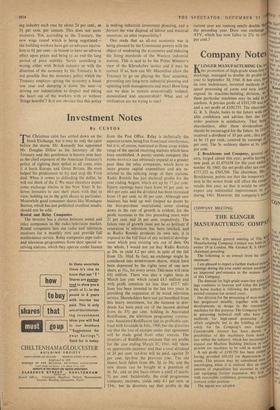Investment Notes
By CUSTOS
THE Christmas calm has settled down on the Stock Exchange, but it may be only the calm before the storm. Mr. Kennedy has appointed Mr. Douglas Dillon as his Secretary of the Treasury and this gentleman is known over here as the chief exponent of the American Treasury's policy of righting their deficit at all costs, even if it hurts Europe and Great Britain. He even helped his predecessor to try and stop the Ford deal. When it comes to defending the dollar, he will not think of the £. We must therefore expect some exchange alarms in the New Year. It be- hoves investors to cast their plans with that in view, holding on to the gold shares in particular. Meanwhile good consumer shares like Montague Burton, which has just published excellent results, should not be sold.
Rental and Relay Companies
The investor has a choice between rental and relay companies in the radio/television market. Rental companies hire out radio and television receivers for a monthly rent and provide full maintenance service. Relay companies pipe radio and television programmes from their special re- ceiving stations, which they operate under licence from the Post Office. Relay is technically the superior system, being free from local interference, but it is, of course, restricted to those areas within range of the special receiving stations which have been established. A purely rentals company like RADIO RENTALS can obviously expand at a greater pace than the relay companies, which have to incur greater capital expenditure and are re- stricted to the relaying range of their stations. Radio Rentals has just declared profits for the year ending August, which are up by 17 per cent. Equity earnings have risen from .44 per cent. to 60.6 per cent. and the dividend has been increased from f 5 per cent. to 20 per cent. Although new business has held up well (helped no doubt by the hire-purchase restrictions) some slowing down in .the rate of growth is evident, for the profit increases in the two preceding years were 21 per cent. and 26 per cent. respectively. The future rate of growth must not be so brilliant if saturation in television has been reached, and as Radio Rentals produces its own sets, it is exposed to the full blast of any technical develop- ment which puts existing sets out of date. On the whole, I would not yet buy Radio Rentals at 24s. to yield 4.2 per cent. in spite of the fall from 32s. 104d. In fact, an exchange might be considered into REDIFFUSION shares, which have been depressed by the rights issue of one new share, at 31s., for every seven. This issue will raise £44 million. There was also a rights issue in March last year which raised £4.1 million and with profit retention no less than £15.7 mil- lions has been invested in the last two years in providing the expansion of its wired television service. Shareholders have not yet benefited from this heavy investment, for the increase in divi- dends has been paid out of the income derived from its 374 per cent. holding in Associated Rediffusion, the television programme contrac- tors. Associated Rediffusion lost its profitable con- tract with Granada in July, 1960, but the directors say that the loss of receipts under that agreement will be made good from other sources. The directors of Rediffusion estimate that net profits for the year ending March 31, 1961, will 'show an appreciable increase' and that a total dividend of 24 per cent. tax-free will be paid, against 20 per cent. tax-free the previous year. The old shares have fallen from 40s. 3d. to 36s. and the new shares can be bought at a premium of 4s. 9d., and on this basis return a yield of nearly 51 per cent. Incidentally, the rival programme company, GRANADA, yields only 4.1 per cent. at 134s., but its directors say that profits in the current year are running nearly double the preceding year. Dare one exchange ATV, which has now fallen to 27s. to yie per cent.?


























 Previous page
Previous page